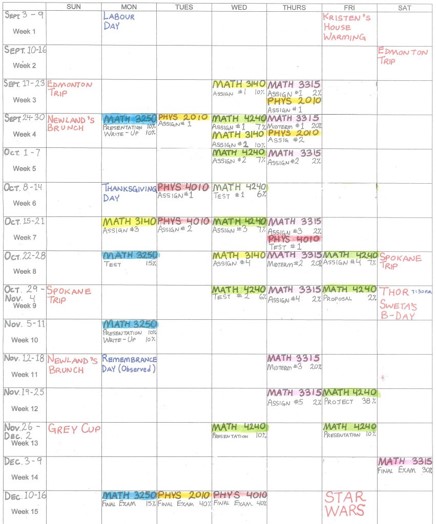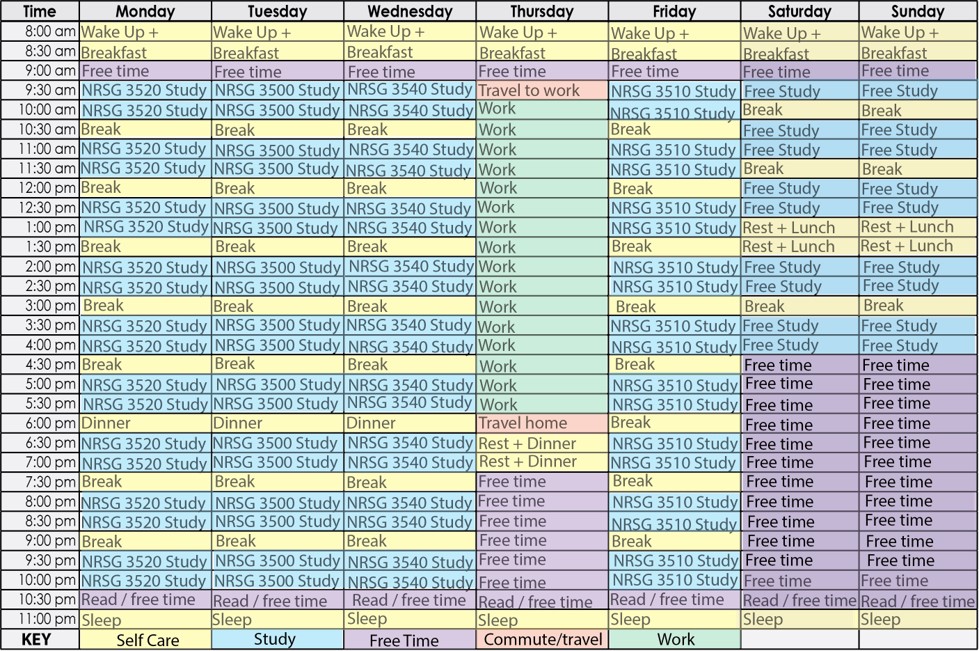Manage Time
Good time management skills can increase your productivity, help you get more done, and reduce your stress. Plan out how you will spend your time and where you will focus your attention so that you get the best value from your studies.
There are three levels of time management strategies:
- Semester/”Big picture” time management
- Weekly planning
- Daily planning
Semester Planning
At the start of the semester, your first step is to carefully review the course presentation and Moodle site for each of your classes. This enables you to see the major assignments and regular weekly tasks you will do throughout the semester.
A semester schedule will give you a visual picture of the assignments, projects, tests, exams and other key events that will happen in your life during the upcoming months.
Using colour is an effective way to indicate different classes and to distinguish between your academic events and personal events.
Look at the example semester schedule shown here. What do you notice about what the student chose to include? What will you include on your semester schedule?

Weekly Schedule
Your weekly schedule includes your designated learning time, work commitments, volunteer roles, practicum placements, as well as any other regular events in your week. A weekly schedule is a good tool to evaluate whether your time use allows you to meet your overall goals. Do you have enough time for study? Is there time to maintain a healthy lifestyle?

Analyze this example student schedule. What do you notice about how this student has planned their week?
Principles to Consider:
- Designate multiple, shorter blocks for study for each course. Shorter blocks of time allow you to maintain focus, study efficiently, and maintain momentum through the course. Avoid the temptation to schedule work for a course on only one day per week.
- Schedule regular breaks
- Plan a schedule that you can stick to – and then hold yourself accountable to following the schedule. Ask friends or family to help.
- Designate places along with times for study. This will help you to maintain a break between study, family/social life, and work.
Daily Planning
When you come to your learning space, you will also want to come with specific goals. Creating a task list for the day can help you consider how to best make use of small blocks of time throughout the day.
Start by making a list of what you plan to accomplish today, if time permits. Be sure that each task is specific, and measurable, and that it can be completed within your time frame. For example, “work on my English paper” is not specific, whereas “write a thesis statement and outline for my English paper” gives a clear focus for your work.
Next, prioritize your list to ensure that you focus on the more important tasks rather than completing tasks simply in the interest of clearing your list.
Check off tasks as you complete them and reward yourself for staying focused as you move through your work.
At the end of the day, review your progress. If there are tasks remaining on your list, consider where they might fit in your to-do list for the next day.
Example Daily Task List
- Watch Accounting video lecture and take notes
- Complete Accounting chapter 2, brief exercises 1-2
- Find 3 articles for organizational behaviour project
- Prepare article summary for team project meeting
- Type team project meeting minutes and send to team
- Edit summary for English summary assignment
- Book writing tutor appointment
